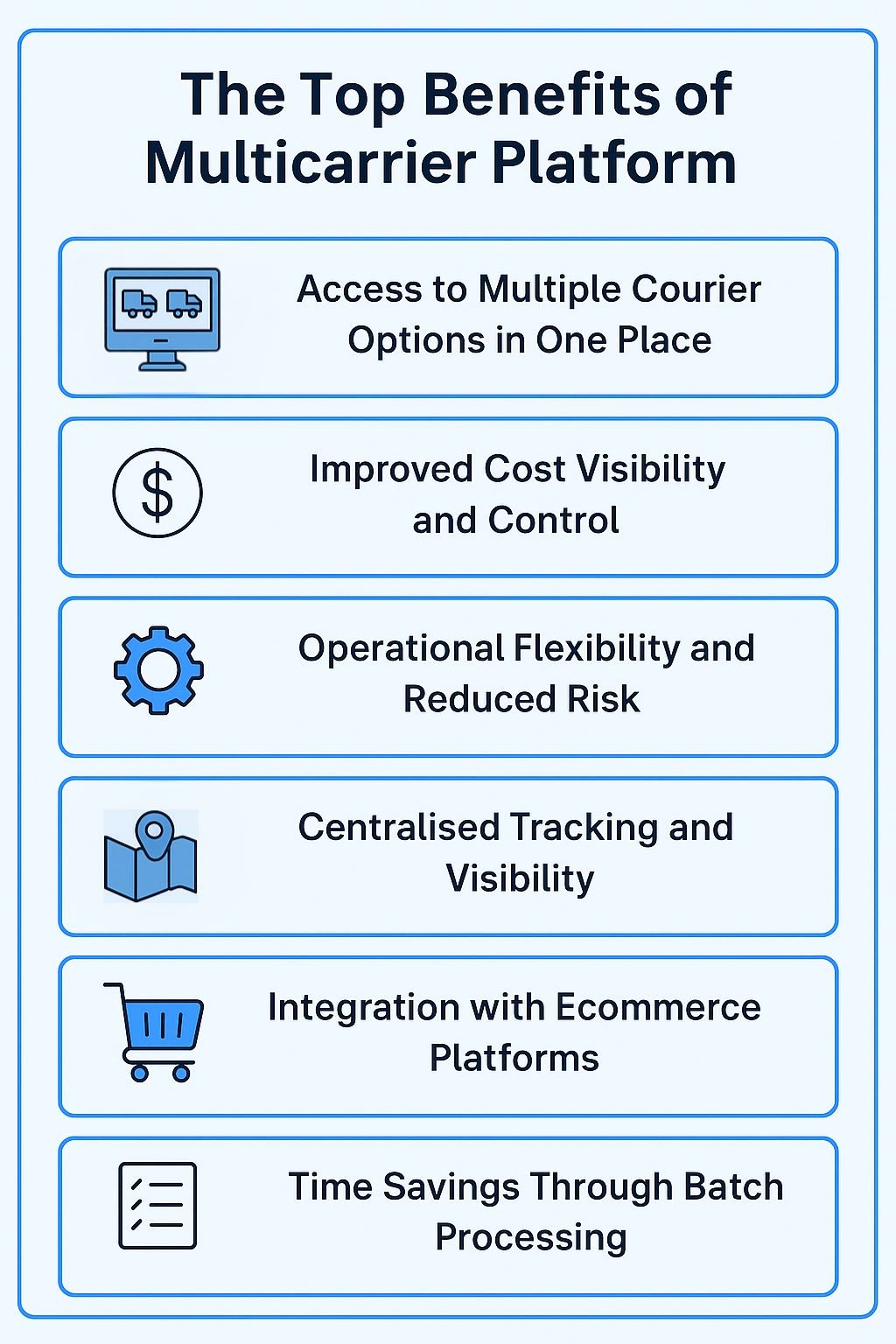Running an ecommerce store or managing logistics isn’t easy.
Orders don’t just magically ship themselves. You’ve got to process them, pick couriers, find rates that won’t destroy your margins, print and stick labels, and make sure everything arrives on time.
And when you are doing this on multiple courier websites…
It's chaos.
You can end up spending hours juggling between courier websites, comparing rates, chasing down tracking info, and not to mention manually adding in data from your ecommerce store into each courier website.
By the end of the day, you're spending more time on shipping than on your actual business.
That’s exactly why multicarrier shipping platforms exist, and why more and more businesses are leaving behind outdated, manual shipping processes.
So let's break down exactly how it all works.
So, What Exactly Is a Multicarrier Shipping Solution?
A multicarrier shipping platform (also called a multi-courier shipping solution or shipping management system) is a tool that lets businesses compare, book, and manage shipments across multiple courier providers, all in one place.

Rather than logging into individual courier websites, you enter your shipment details once and receive real-time quotes from different carriers.
You can then choose the best option based on price, speed, or service level, and print shipping labels directly from the platform in bulk.
You also don’t need to be operating at high volumes to benefit. In fact, small and medium-sized businesses often get the most value from multicarrier systems, as they allow you to compete with larger brands on shipping speed and service quality, without the need for large teams or complicated logistics infrastructure.
Why Stick With Just One Carrier When You Can Have Them All?
Relying on a single carrier might seem like the simplest option, but it can also create limitations.
If their rates increase, their delivery times change, or they don’t offer the type of service you need, like express or international, your options become restricted.
With a multicarrier solution, you have more flexibility. You can evaluate each shipment individually and choose the most suitable service based on your priorities:
- Choose based on price
- Choose based on speed
- Choose based on reliability
If one carrier doesn’t meet your needs for a specific order, you can easily switch to another.
And because everything is managed within one platform, there’s no need to create separate courier accounts.
The Top Benefits of a Multicarrier Platform
Managing shipping across multiple carriers manually can be time-consuming, error-prone, and inefficient, especially as your order volume grows.
A multicarrier shipping platform is designed to simplify that process by centralising courier options, streamlining fulfilment, and offering greater flexibility with each order.
Here are some of the core benefits a multicarrier platform can offer your business.
1. Access to Multiple Courier Options in One Place
Multicarrier platforms consolidate various courier services into a single dashboard. You can compare carriers by price, speed, and service level, without jumping between different websites or setting up multiple accounts. This streamlines your decision-making and helps you quickly find the best courier for each shipment, based on your specific needs.
2. Improved Cost Visibility and Control
Being able to view and compare real-time shipping rates across providers helps ensure you’re selecting the most cost-effective option for each parcel. Over time, this can reduce overall shipping costs, especially for businesses with varying parcel sizes, destinations, or delivery timeframes.
3. Operational Flexibility and Reduced Risk
Relying on a single courier provider can create bottlenecks if that service becomes delayed, unavailable, or too costly. A multicarrier platform gives you alternatives, allowing you to adjust quickly and keep orders moving, especially during peak periods or supply chain disruptions.
4. Centralised Tracking and Visibility
Multicarrier platforms provide a single dashboard where you can track all your shipments, regardless of which courier is handling them. This makes it easier to monitor delivery progress, respond to customer enquiries, and maintain visibility over your logistics. All you need to do is add your tracking number to the track my parcel page to get real-time updates on your parcel’s journey.
5. Integration with Ecommerce Platforms
You can typically integrate directly with ecommerce platforms like Shopify, WooCommerce, Wix, eBay and others. This allows you to automatically import orders, generate shipping labels, and update fulfilment statuses without manual entry, reducing errors and saving time.
6. Time Savings Through Batch Processing
Bulk uploading orders, batch printing labels, and automating fulfilment help reduce repetitive tasks. For businesses handling dozens or hundreds of orders daily, this can result in significant time savings and more streamlined workflows.

What to Look for in a Multicarrier Shipping Solution
Choosing the right multicarrier platform depends on the specific needs of your business, but there are several key features that are generally important for operational efficiency and long-term scalability.
Below are some of the core elements to evaluate when assessing potential platforms:
1. Range of Supported Couriers
A platform that offers access to a broad selection of domestic and international courier services provides greater flexibility. It enables you to select the most appropriate provider for each order based on cost, delivery speed, or service availability, helping to reduce risk and avoid dependency on a single carrier.
2. Integration with Ecommerce Platforms
Ensure the platform can integrate with the systems you use to manage orders, such as Shopify, WooCommerce, Wix, or other ecommerce platforms or marketplaces. This enables a streamlined workflow, reduces manual data entry, and minimises errors.
3. Efficient Order Processing Tools
Look for tools that support bulk actions such as importing orders, printing labels, and booking shipments. These features help reduce fulfilment time and allow you to process high volumes of orders with greater efficiency.
4. International Shipping Capabilities
If your business plans to ship internationally, verify that the platform includes access to reliable global courier partners and supports the documentation and processes required for cross-border shipments.
5. Shipment Tracking and Brand Customisation
A platform that offers centralised tracking can improve visibility across all shipments. The ability to customise tracking pages with your brand’s logo, colours, and messaging also supports a more cohesive customer experience after checkout.
6. Transparent Pricing Structure
Examine the pricing model closely. Platforms that operate on a pay-per-shipment basis, without subscription fees or hidden charges, can offer more cost control and are often a better fit for businesses with fluctuating shipping volumes.
How Interparcel Supports Small and Medium Businesses
Interparcel’s multicarrier shipping platform is designed to meet the operational needs of growing ecommerce businesses. It offers a range of features intended to streamline fulfilment, reduce administrative workload, and provide greater flexibility across courier options.
Key features include:
No Subscription Fees or Lock-In Contracts
Businesses can access the platform and its features without committing to monthly plans or long-term agreements, making it suitable for varying shipping volumes.
Integration with Major Ecommerce Platforms
Interparcel integrates with systems such as Shopify, WooCommerce, Wix, eBay, and others, allowing users to import and manage orders directly from their online store.
Access to a Broad Range of Couriers
The platform supports both domestic and international courier services, giving businesses the ability to select from multiple carriers based on cost, delivery speed, or customer location.
Branded Tracking Options
Users can customise tracking pages to reflect their own branding, offering a more consistent post-purchase experience for customers.
Local Customer Support
Interparcel provides Australia-based support to assist businesses with platform usage, order management, and courier-related enquiries.
This combination of features makes the platform a practical solution for businesses looking to improve their shipping process while maintaining flexibility and control.
Simplifying Shipping for Growing Businesses
As your ecommerce business grows, so does the complexity of fulfilment. Managing multiple carriers manually can slow down operations, increase the risk of error, and take time away from more strategic tasks.
A multicarrier shipping solution can help streamline this process by centralising courier options, automating key fulfilment steps, and offering greater flexibility when handling orders. It allows businesses to compare services, reduce operational risks, and maintain a more efficient shipping workflow, all from a single platform.
Whether you're looking to save time, control costs, or scale more smoothly, exploring multicarrier platforms is a practical step toward building a more resilient and efficient shipping strategy.










 Facebook
Facebook Twitter
Twitter Instagram
Instagram Linked In
Linked In YouTube
YouTube